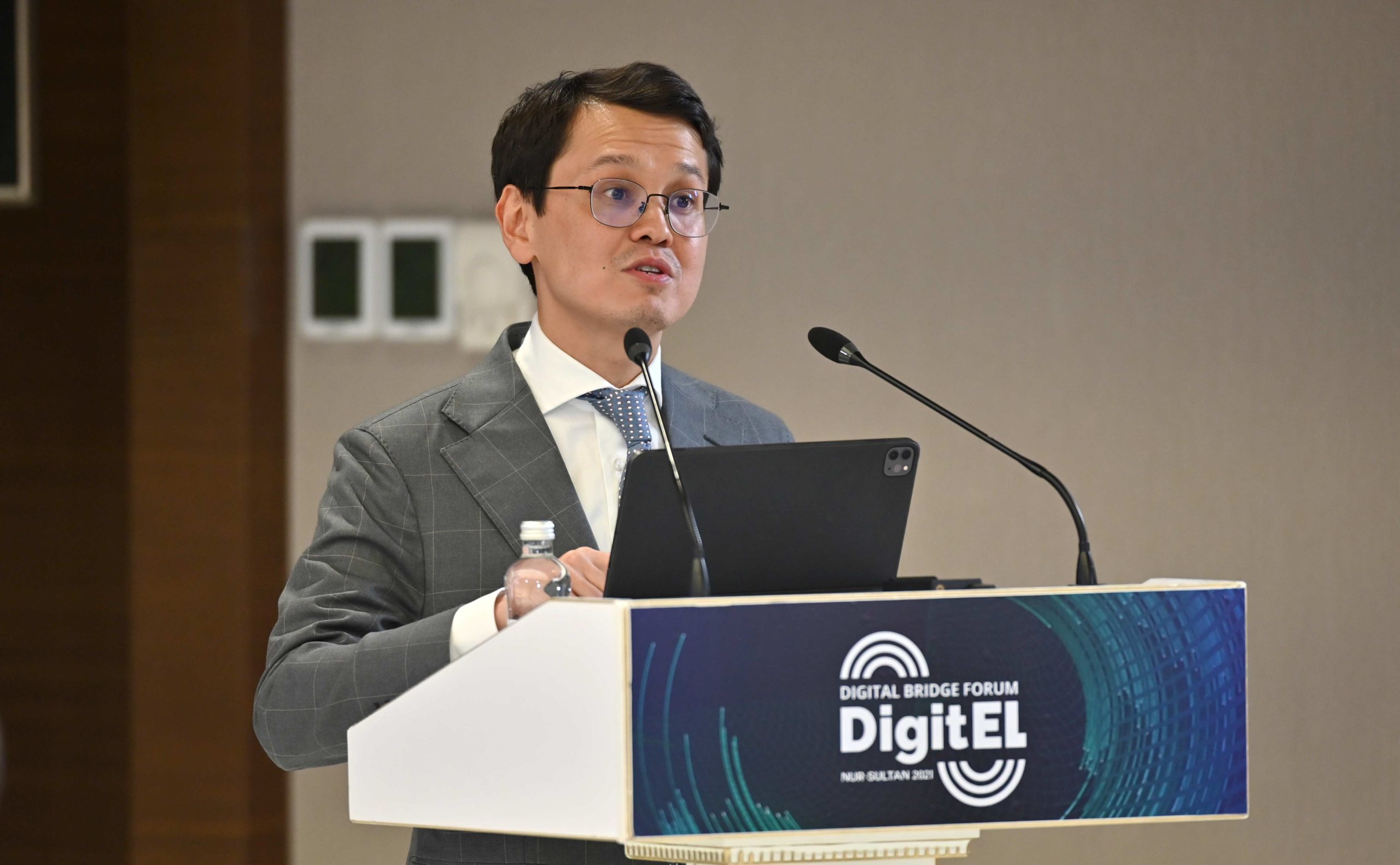NUR-SULTAN – Kazakh capital Nur-Sultan is hosting Digital Bridge Forum on Oct. 28-29 to promote digitization in the country and provide businesses and startups with more access to resources, including learning opportunities. Nearly 4,000 participants registered for the two-day event.
President Kassym-Jomart Tokayev visited the forum a day earlier, where he was briefed on the progress Kazakhstan is making in digital transformation and the achievements of Astana Hub, the country’s international technopark of IT startups tasked with fostering digital transformation and nurturing local IT specialists.

President Tokayev watches the presentation of a startup at the alley of startups. Photo credit: Akorda
During his visit, Tokayev stressed the importance of ensuring that digital transformation covers all areas of the country’s economic and social life, including the way public services are provided.
He said that “the end goal is not simply to convert services from offline to online, but to reduce the sheer number of state services and the number of related requests, answers, and approvals.” This should be part of a broader effort to tackle bureaucracy, corruption and inefficiency in the state apparatus.
He tasked the government and the country’s Atameken National Chamber of Entrepreneurs to conduct an audit of all public services and ensure their digital optimization.
A real digital leap will only be possible with the broad involvement of businesses, said Tokayev, noting that the competitiveness of companies is largely contingent upon their level of digitization.
“According to Siemens, 80 percent of domestic industrial enterprises have an extremely low level of automation – at the level of Industry 2.0. But we live in the era of Industry 4.0. This is a challenge, but a clear solution stems both from the conceptual and practical points of view,” he said.
Tokayev said that as the country continues to take measures to digitize, ensuring the security of personal data remains an important task.
“We must understand that the formation of a digital infrastructure also means responsibility for its security – the quality of legal and physical protection of personal data. This applies not only to state systems but also to digital ecosystems that are closely integrated with the state. The government should develop a package of legislative changes to tighten liability for the loss or theft of citizens’ personal data,” he said.
In its path towards achieving greater digitization, Kazakhstan seeks to increase the volume of IT investments to 500 billion tenge (US$1.16 billion) per year, and the total volume of exports of IT goods and services to US$500 million.
“The export of IT solutions can and should become one of the significant areas of diversification of the domestic economy,” said Tokayev emphasizing the support that should be provided to the country’s emerging IT products and services.
With Minister of Digital Development, Innovations and Aerospace Industry Bagdat Musin, Tokayev walked along an alley of startups.

Bagdat Musin. Photo credit: Akorda
Musin, who has been serving as the minister since September 2020, also said that the transition to a new level requires “new thinking, new approaches and technological changes.”
“Since the early 2000s, we have focused on process automation. We have achieved good results. (…) Now we set the task to be closer to citizens, and solve specific life situations. In this regard, we are bringing services to digital ecosystem platforms. We are working on process re-engineering,” said Musin.
What does Kazakhstan offer?
Sanjar Taromi, country manager for Kazakhstan at the Plug and Play Tech Center, the world’s largest early-stage investor, accelerator, and corporate innovation platform based in the Silicon Valley, said that Kazakhstan has several factors that draw foreign companies into the country.
“A lot of young educated people in Kazakhstan. This system of sending young Kazakhstanis abroad (referring to the country’s Bolashak presidential scholarship) to study and come back, I don’t know if we would have been able to build our work here if that system was not here. All of the people who we have been hiring in Kazakhstan benefited from that program. Really educated workforce, really talented people,” explained Taromi, who represents Plug and Play in Kazakhstan, in an interview for this story.
He said that there are many Kazakh nationals working in Silicon Valley.
“A lot of good startups. But they need that mentorship, they need somebody to believe in them and engage with them. You have really major industries from mining to oil and gas that are relevant to the world. There is a lot of good to be said about Kazakhstan and that’s why we are here,” he said.
The forum will continue on Friday with a wide range of offline sessions and online webinars open for all.

